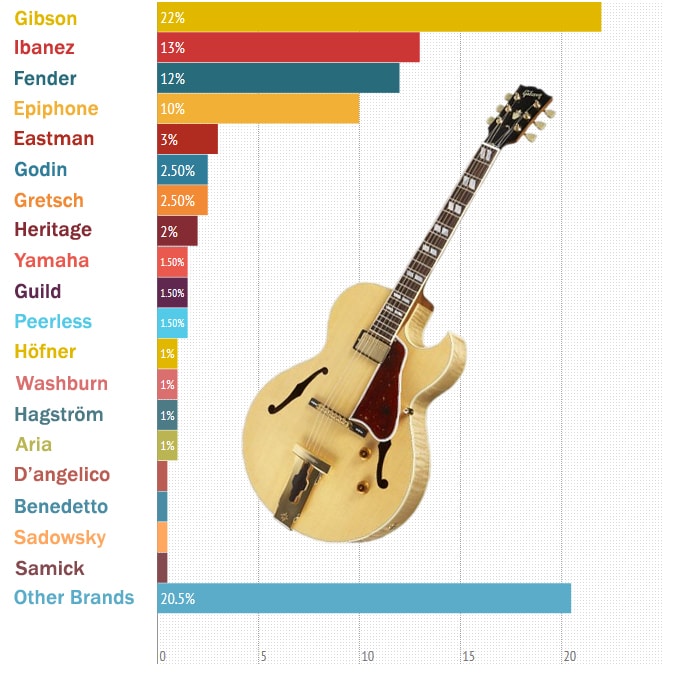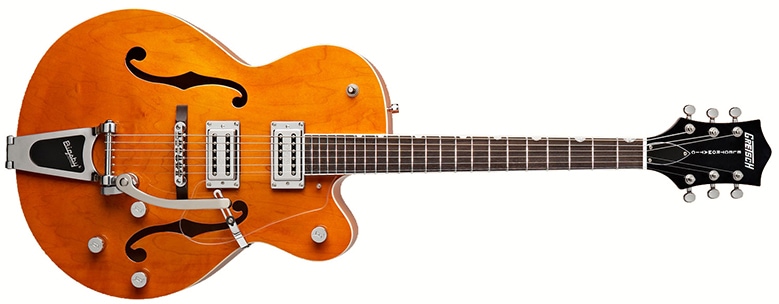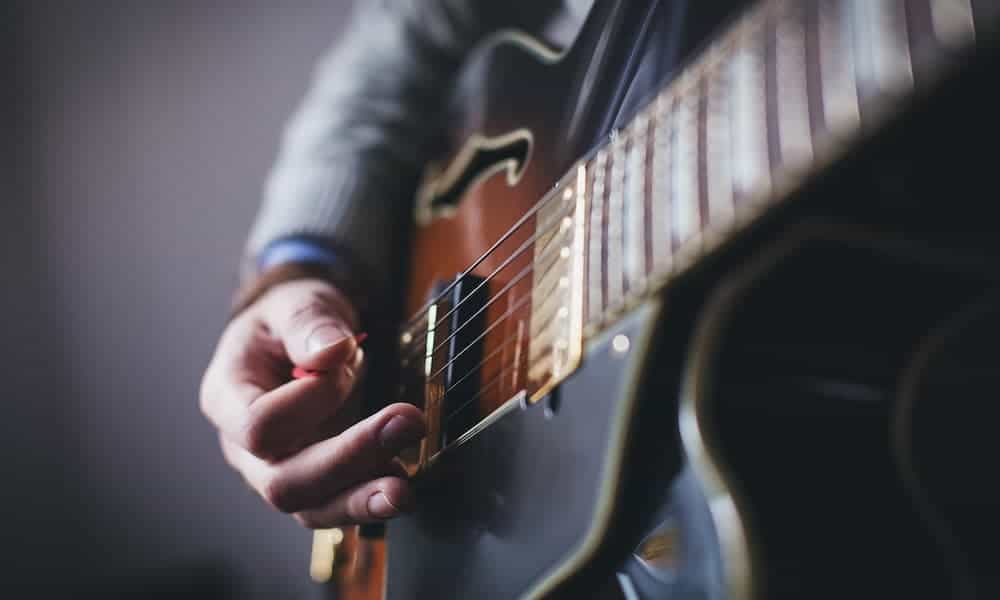The Gibson ES-175 is widely recognized as the quintessential electric guitar for jazz. Its warm, full-bodied tone sets the standard for jazz guitarists.
Given the rich history of jazz and the nuanced preferences of guitarists, selecting the best electric guitar for jazz is a blend of legacy and personal taste. The Gibson ES-175, with its distinctive archtop design and dual humbuckers, delivers the smooth and mellow sound that is synonymous with classic jazz tunes.
Originating in 1949, this guitar has been the choice of countless jazz legends, thanks to its articulate response and comfortable playability. Aspiring and professional jazz musicians alike praise its consistent performance and the character it brings to jazz music. For anyone serious about jazz, the ES-175 offers a tried-and-true avenue to achieving those beloved warm, liquid tones that define the genre.

Credit: www.jazzguitar.be
Introduction To Jazz Guitar
Jazz, a genre that epitomizes sophistication and complexity, makes unique demands of its musicians, particularly guitarists. The best electric guitar for jazz is not just an instrument; it’s a vessel that carries the rich history and sonic nuances of jazz music. Jazz guitarists often seek guitars that can produce warm, articulate tones, allowing them to blend seamlessly into ensembles or take the lead with lyrical solos. In the quest for the ideal jazz guitar, understanding the role this instrument plays in jazz music and the characteristics it must possess is vital.
The Role Of The Guitar In Jazz Music
The guitar has long held a coveted spot in the jazz ensemble, known for its versatility and expressive capacity. Its role has evolved from providing rhythmic support in early swing bands to fostering intricate solo work that characterizes modern jazz. Electric jazz guitars, with their ability to produce a spectrum of sounds, empower players to experiment and innovate within the genre.
Characteristics Of A Jazz Guitar
Identifying the right guitar for jazz involves a keen understanding of several key features. A desirable jazz guitar typically includes:
- Body Type: Hollow or semi-hollow bodies that offer naturally warm and full tones favored in jazz.
- Neck and Fingerboard: Comfortable neck profiles with a smooth fingerboard, facilitating the complex fingerwork jazz requires.
- Pickups: Typically, humbucker pickups are the go-to for their noise-canceling properties and rich sound.
- Hardware: High-quality tuning machines, bridge, and tailpiece ensuring tuning stability and tone precision.
When these characteristics come together in harmony, the result is a guitar that not only accomodates the technical demands of jazz but also resonates with the soulful and dynamic essence of the genre.
Key Considerations When Choosing A Jazz Guitar
Embarking on the quest for the perfect jazz guitar can be both exhilarating and daunting. Jazz, a genre that prizes tone and expressiveness, demands an instrument that adequately responds to the nuances of this complex musical style. The apt choice of an electric guitar for jazz comes down to a series of key considerations. Let’s delve into the factors that guide musicians in their pursuit of the ideal jazz guitar.
Tonewood And Body Style
The resonant qualities of a guitar are profoundly influenced by its tonewood and body style. For jazz players, a warm, rich, and full-bodied tone is often preferred, making woods like mahogany, maple, and walnut highly sought after. Semi-hollow and hollow-body guitars are particularly renowned for their mellow sound profile, suitable for the intricate chords and melodious runs characteristic of jazz.
Pickups And Electronics
Pickups serve as the voice of an electric guitar, and in the realm of jazz, humbucker pickups tend to reign supreme. They offer a thicker, smoother sound with less humming, ideal for the clean, articulate tone jazz guitarists yearn for. Pair that with customizable electronics, like tone knobs and toggle switches, and players gain the capacity to sculpt their signature sound.
Neck Shape And Fingerboard
A guitar’s playability is largely dictated by its neck shape and fingerboard. Jazz musicians often gravitate towards a comfortable neck profile and a fingerboard that allows effortless navigation for complex chords and fast passages. Look for a neck that fits snugly in the hand, with a fingerboard material—such as rosewood or ebony—that provides a smooth, quick-playing surface.
Scale Length And String Gauge
The scale length of a guitar influences both the tension of the strings and the instrument’s tonal characteristics. Jazz players might prefer a shorter scale length for easier string bending and a darker tone. Conversely, the string gauge can affect both playability and sound. Jazz guitarists often lean towards heavier gauge strings for a fuller, warmer tone that complements the genre’s style.
Price Range And Brands
Your budget plays a crucial role in determining your options. Regardless of whether you’re looking for an entry-level model or a professional-grade instrument, reputable brands such as Gibson, Ibanez, and Fender offer a range of electric guitars tailored to the jazz musician’s needs. It’s important to invest in an instrument that not only meets your technical criteria but also aligns with your personal budgetary constraints.
Top Electric Guitars For Jazz
Embarking on a journey into the smooth, soulful world of jazz requires the right instrument by your side. Selecting the perfect electric guitar that embodies the richness of jazz can elevate your playing to new heights. Let’s dive into some of the most revered electric guitars that have become synonymous with the genre’s lush tonal landscape.
Gibson Es-175: The Classic Choice
The Gibson ES-175 stands as a towering figure in the jazz community. Debuting in the golden era of jazz, it’s known for its warm, full-bodied sound and exceptional playability. With its iconic archtop design, dual humbuckers, and a comfortable neck, it’s a go-to instrument for jazz aficionados seeking that vintage tone.
Ibanez Artcore Series: Affordable Quality
Quality doesn’t always have to come at a high price, and the Ibanez Artcore Series proves just that. These guitars are praised for their craftsmanship and smooth playability. Featuring a variety of models, the Artcore series offers versatile tones catering to a range of jazz styles, all while keeping your budget in check.
Fender Telecaster: A Versatile Option
While often associated with country and rock, the Fender Telecaster is a surprisingly adaptable instrument for jazz guitarists. Its bright and clear tonal properties can be softened through the right amp settings, offering a crisp yet rounded sound. The Telecaster’s versatility lets it cross genres effortlessly, a testimony to its timeless design.
Heritage Guitars: Handcrafted Beauty
Heritage Guitars, birthed from the historic Gibson factory in Kalamazoo, Michigan, bear a legacy of expert craftsmanship. These handcrafted instruments, including the H-575 model, provide smooth, mellow tones ideal for intricate jazz chording and soloing, and are a testament to the brand’s commitment to quality and tradition.
Godin 5th Avenue: The Rising Star
Emerging as a new favorite among jazz musicians, the Godin 5th Avenue brings a touch of modernity to the classic archtop acoustic-electric design. With its Canadian craftsmanship, this guitar offers a dynamic range and a distinctive tone, making it an exciting choice for those looking to stand out in the jazz scene.

Credit: www.jazzguitar.be
Playing Techniques And Setup Tips
Exploring the world of jazz guitar is an enchanting journey filled with nuance and a deep appreciation for tone and technique. Whether you’re a seasoned guitarist pivoting to jazz or a burgeoning player with a love for the genre, grasping the essentials of playing techniques and setup is fundamental to capturing that quintessential jazz sound. Jazz is characterized by its smooth, flowing lines and complex chordal harmonies, and achieving that distinctive tone requires not just the right instrument but also the mastery of certain techniques and the knowledge of how to optimize your setup.
Techniques For Achieving A Jazz Tone
Jazz guitarists are maestros of expression, bending the strings and the standard conventions of playing to craft something truly unique. A clean, articulated tone is the bedrock of jazz guitar, and this is often accomplished through:
- Fingerstyle playing for a smooth, natural sound
- Using thumb picks or soft plectrums to temper the attack
- Legato techniques to connect notes fluidly
- The delicate balance of chromatics and arpeggios to weave intricate melodies
Setting Up Your Guitar For Jazz
_Achieving an authentic jazz sound_ starts with your guitar’s setup. String choice, action, and intonation all play vital roles. Jazz guitarists often prefer:
- Flatwound strings for a warmer, drier tone
- A higher action to avoid fret buzz and enable dynamic playing
- Precise intonation to ensure chords resonate perfectly across the fretboard
Customizing your electric guitar’s setup not only serves your playing comfort but also defines your tonal signature.
The Importance Of Amps And Pedals In Jazz Tone
The alchemy of jazz tone doesn’t end with the guitar—it extends to your amp and pedals. A high-quality amplifier set to a clean channel is the canvas for your sonic artwork, enabling a pure sound that can be subtly colored with effects. Jazz guitarists often employ:
- A tube amplifier for its natural, warm distortion characteristics
- A mild reverb to add depth without overpowering the clean signal
- The restrained use of chorus or delay pedalso to enhance texture while maintaining clarity
Each element of your rig—from the strings you choose to the way your amplifier breathes—contributes to your voice on the guitar. Through mindful selection and setup, you can construct a tasteful, resonant tone that speaks the language of jazz with fluency.
Conclusion: Finding Your Own Jazz Voice
Embarking on the quest to find the best electric guitar for jazz is a personal journey towards discovering your unique sound. It’s an adventure that blends historical richness with individual expression, leading to the holy grail of jazz musicianship: your own voice. Weighting options and honing in on what resonates with you are crucial steps in this process. Here, we will discuss the final considerations to make before choosing the instrument that will help you articulate your jazz narrative.
Making An Informed Decision
The pathway to choosing the right jazz guitar is paved with knowledge and understanding. A discerning jazz guitarist considers various factors that contribute to the overall sound and feel of the instrument:
- Body Style: From hollow-body archtops to solid-body models, each guitar brings its tone and aesthetic.
- Pickups: Humbuckers typically offer a warm, fat tone, ideal for jazz, but single-coils can also provide a brighter sound if that’s what you prefer.
- Wood Type: The resonance and sustain of the guitar depend on the wood, influencing the instrument’s tonal character.
- Neck Profile: A comfortable neck profile can make a significant difference in playability, especially during extended playing sessions.
Research, combined with playing a variety of guitars, will guide you toward a well-informed decision, ensuring the guitar you select meets your technical and tonal requirements.
Personal Preference And Playability
While specifications and features are important, personal preference plays the lead role in choosing an electric guitar. The perfect jazz guitar should feel like an extension of your body, seamlessly blending with your playing style. You should consider:
- Neck Comfort: The neck should feel comfortable in your hand, allowing you to move freely and effortlessly.
- String Action: The string height above the fretboard affects the instrument’s playability and your ability to articulate notes.
- Overall Balance: The guitar’s weight and balance are vital for your comfort, especially during longer gigs or practice sessions.
Ultimately, the feel of the guitar and how it responds to your touch will dictate your comfort level and your ability to express yourself musically.
The Journey Of A Jazz Guitarist
Becoming a jazz guitarist is more than mastering scales and chords; it’s about developing a voice that speaks through your instrument. Your guitar is your partner in this lifelong journey of growth and exploration. Remember:
- Every great jazz guitarist started with a dream and a deep appreciation for the genre.
- Practice and dedication are the bedrocks upon which your individual jazz voice will be built.
- Finding the right guitar is a milestone in your career, but it’s your creative spirit that will truly define your sound.
In this quest, you will encounter many guitars, each with its story and soul. Choose the one that resonates with you emotionally and sonically, and let it be the vessel that carries your unique jazz voice to the world.

Credit: jazzguitartoday.com
Frequently Asked Questions Of What Is The Best Electric Guitar For Jazz
What Type Of Electric Guitar Is Best For Jazz?
Hollow or semi-hollow body electric guitars are ideal for jazz, offering warm, rich tones. Popular models include the Gibson ES-175 and Ibanez Artcore series.
What Guitar Is Used In Jazz?
The archtop guitar, particularly models like the Gibson ES-175, is widely used in jazz for its warm, mellow tone.
Can Jazz Be Played On Electric Guitar?
Yes, jazz music can certainly be played on an electric guitar. This instrument offers versatile sound options ideal for jazz’s complex harmonies and improvisations.
Which Fender Guitar Is Best For Jazz?
The Fender Jazzmaster is widely regarded as the best Fender guitar for jazz, favored for its warm tones and versatile electronics.
Conclusion
Selecting the ideal electric guitar for jazz is a personal journey. The perfect instrument balances playability, tone, and style. Among the contenders, models from Gibson, Fender, and Ibanez stand out. Your quest ends when you find the guitar that resonates with your musical soul.
Remember, the best jazz tones start with your touch.
